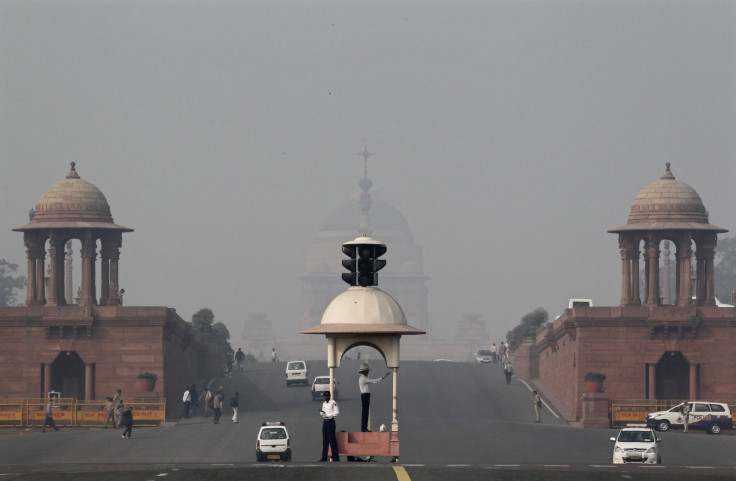Pressure Mounts On India To Tackle Greenhouse Gas Emissions Ahead Of 2015 Climate Change Talks In Paris

India is facing mounting international pressure to reduce its greenhouse gas pollution, even as its population booms and economy expands. U.N. Secretary-General Ban Ki-moon on Tuesday urged the nation to play a more aggressive role in this year's global climate change talks in Paris. His comments come just weeks before U.S. President Barack Obama is set to discuss joint climate efforts with India during a trip to New Delhi this month.
“I count on the leadership of India in our ongoing efforts to address the climate change issues,” Ban told reporters on his stop in India. “Nature does not wait for us. Nature does not negotiate with us. It is us human beings who have to take the lead to ensure sustainable development.”
India is among the nearly 200 nations that agreed in December to develop a global plan for tackling greenhouse gas emissions. At a U.N. conference in Peru, countries gave themselves until June at the latest to present individual strategies for curbing carbon and developing cleaner energy sources. The extent to which the global accord can address climate change depends on how ambitious countries are in setting targets. A final treaty could be signed in Paris this December.
India has so far indicated that its U.N. plan won’t be as aggressive in reducing emissions as experts say is necessary. India is the world’s third-largest carbon polluter, behind China and the United States, and it accounts for about 6 percent of the world’s total emissions. That share is expected to rise in coming decades as India’s population leaps from 1.2 billion people to 1.6 billion by 2050 and as the country adds more fossil fuel-fired power plants to meet soaring energy demand.
“There’s a great opportunity [for India] to play the role of global leader and citizen,” Andrew Steer, president and chief executive of the World Resources Institute, a research organization, said at a Jan. 9 conference. “The question for India is ... will it develop the right kind of balanced growth? One can accelerate growth and get into all the [pollution] traps that other countries have got into. Or ... will India successfully embrace high efficiency and low-carbon growth?”
Prime Minister Narendra Modi's administration has said repeatedly that India’s top priority is growing the economy and reducing rates of poverty -- a move leaders insist will require building more coal plants and guzzling more petroleum-based fuels. “India’s first task is eradication of poverty,” Prakash Javadekar, the nation's environment minister, told the New York Times at a U.N. summit in New York City last September. “We will grow faster, and our emissions will rise.”
Javadekar added that since developed countries, namely the United States, are largely to blame for much of the current greenhouse gas pollution in the atmosphere, those nations are more responsible for cutting emissions than industrializing economies like India. “The moral principle of historic responsibility cannot be washed away,” he told the Times.
But the environment minister insisted that India is taking ambitious steps to address climate change. The Modi government recently set a target to expand India’s solar capacity by 30 times, to 100,000 megawatts, by 2022. He has also pledged to invest $1.2 billion in 100 “smart cities,” which would use high-tech communications technologies to minimize energy consumption, increase public transportation and limit water usage.
At the U.S. conference in Peru, Javadekar told reporters the country would submit a strategy by June that shows how India will lower the rate at which it produces pollution. Such a goal, however, is different from pledging to reduce overall emissions, as the U.S., China and other nations are committed to doing. In a joint announcement with China in November, Obama set a target to cut America’s emissions to 28 percent below 2005 levels by 2025. Chinese President Xi Jinping pledged to cap China’s emissions by 2030, marking a major shift in the country’s climate policy, which for years has steered clear of any measure that could limit industrial growth and energy production.
Obama’s upcoming discussions with India are likely to yield only modest measures for tackling emissions. “I am expecting a useful meeting, but we don’t have anything in the works of the kind that we were involved with in China,” Todd Stern, the U.S. State Department’s climate change envoy, told the Guardian in December.
Secretary of State John Kerry, who is in India this week ahead of Obama’s visit, said he and other senior U.S. officials would work with Indian leaders to develop “very concrete and tangible things ... including on climate change” to present to Obama and Modi later this month, according to media reports. Those joint initiatives could include programs to expand research and development of clean energy technologies, including solar power.
In separate remarks Sunday in Ahmedabad, Kerry warned Indian leaders that climate change threatens to disrupt economic opportunities.
“Global climate change is already violently affecting communities, not just across India but around the world,” he said. “It is disrupting commerce, development and economic growth. It’s costing farmers crops. ... It’s raising the cost of doing business. And, believe me, if it continues down the current trend line, we will see climate refugees fighting each other for water and seeking food and new opportunities.”
© Copyright IBTimes 2024. All rights reserved.





















